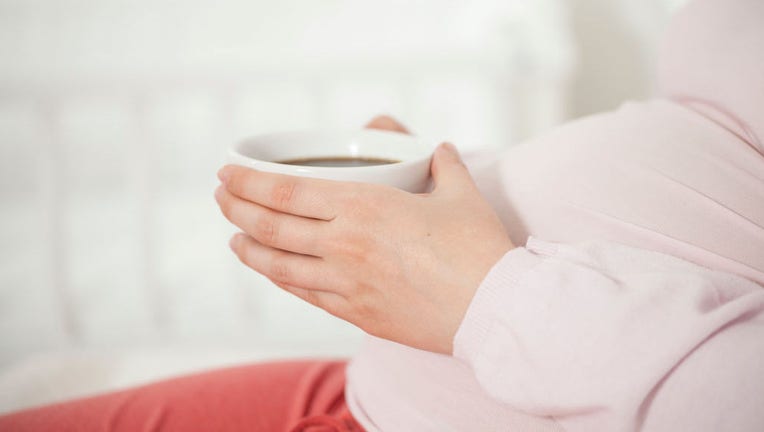Is it OK to drink coffee while pregnant? Yes (in moderation), genetic study suggests

FILE - A pregnant woman holds a cup of coffee in an undated file image. (Photo by Bildquelleullstein bild via Getty Images)
BRISBANE, Australia - Pregnancy generally comes with a list of certain foods and drinks to limit or avoid altogether, such as some raw or undercooked foods. But what about those who enjoy their daily cup of caffeine?
A recently published genetic study suggests that limited coffee consumption is generally safe for pregnancy. Specifically, researchers from the University of Queensland used genetics to analyze coffee-drinking behavior and found that consuming coffee in moderation does not increase the risk of miscarriage, stillbirth or premature birth.
Previous research has suggested potential associations with pregnancy loss and fetal growth at higher caffeine levels. But the data remains limited on the link between caffeine and maternal health outcomes, according to the American College of Obstetricians and Gynecologists (ACOG).
Dr. Gunn-Helen Moen from UQ’s Institute for Molecular Bioscience and author of the latest genetic study noted how much of the research on this topic has been based on observational studies, "where it’s difficult to separate coffee-drinking from other risk factors like smoking, alcohol or poor diet."
"We wanted to find out if coffee alone really does increase the risk of adverse pregnancy outcomes, and the research shows this isn’t the case," Moen said in a statement.
Pregnancy study looks at coffee drinking and genetics
The team, which also included Dr. Daniel Hwang and Caroline Brito Nunes from the Institute for Molecular Bioscience, analyzed genetic data from the Coffee and Caffeine Genetics Consortium, the UK BioBank, the Avon Longitudinal Study of Parents and Children, and 23andMe.
Hwang said coffee-drinking behavior is partly due to genetics, with a specific set of genetic variants playing a role in how much coffee we consume.
"We showed that these genetic variants not only affect coffee consumption in the general population but also in pregnant women," Hwang said of the research.
The study authors used Mendelian Randomisation, a research method that provides evidence about causal relations between modifiable risk factors and disease, using genetic variants.
In other words, the study used eight genetic variants that predicted pregnant women’s coffee-drinking behavior and examined whether these variants were also associated with certain birth outcomes.
"Because we can’t ask women to drink prescribed amounts of coffee during their pregnancy, we used genetic analyses to mimic a randomized control trial," Hwang said.
The genetic analysis found there was no greater risk of miscarriage, stillbirth or premature birth for women who drank a limited about of coffee. But the researchers emphasized that the study only looked at certain pregnancy risks. They cautioned that too much caffeine consumption could affect other important aspects of fetal development.
"For that reason, we don’t recommend a high intake during pregnancy, but a low or moderate consumption of coffee," Moen added.
The study was published on June 9 in the International Journal of Epidemiology.
How much caffeine is safe during pregnancy?
The American College of Obstetricians and Gynecologists recommends that pregnant women limit their caffeine intake to less than 200 mg, which generally equates to about one 12-ounce cup per day — depending on the type of bean, the degree of roasting, and the serving size.
A grande-sized cold brew at Starbucks comes with about 205 mg of caffeine, while a medium-sized iced coffee at Dunkin’ packs about 297 mg of caffeine.
"Most experts agree it’s safe to drink about one cup of coffee a day—that’s 12 ounces (200 milligrams) of caffeine," Dr. Anne Srisuro, an obstetrician-gynecologist in Sacramento, California, wrote in an online Q&A. "Pay attention to tea, chocolate, soft drinks, and other caffeine sources when you’re calculating how much you’re taking in."
This story was reported from Cincinnati.

